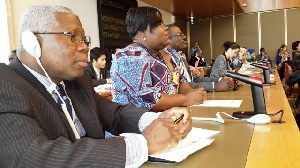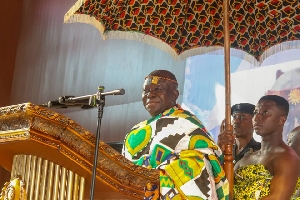Regional News of Friday, 24 October 2014
Source: GNA
Ghana to eliminate discrimination against women
Ghana has outlined ‘Affirmative Action to rectify errors of the past, particularly as they relate to discrimination against Women, Nana Oye Lithur Minister of Gender, Children and Social Protection has said.
In view of the renewed commitment, the national medium-term development policy framework – provides the overall structure for improving the participation of women in key sectors of the economy, as well as putting in place measures to bridge the inequality gap between men and women.
Nana Oye Lithur stated these in an interview with the Ghana News Agency in Geneva, Switzerland on Wednesday on the sidelines of the 59 Session of the United Nations Committee on the Elimination of Discrimination Against Women (CEDAW).
The CEDAW Conference scheduled for October 20 to November 7, offers opportunity for state parties of eight countries, including Ghana, to defend their gender records.
The other seven countries are Belgium, Brunei Darussalam, China, Guinea, Poland, Solomon Islands, and Venezuela.
Nana Oye Lithur, who is leading Ghana’s delegation, said government through the Ghana Shared Growth and Development Agenda (GSGDA), developed broad policy guidelines and strategic direction to increasing the role of women in existing sectors of the economy, such as agriculture, and emerging areas like the energy, oil and gas sectors.
The Gender Minister said government was prosecuting an agenda to eliminate impediments to women’s access to productive employment opportunities; whilst creating enabling conditions for increasing women’s education and training in entrepreneurship, general management and business management, skills training and confidence building.
Specific policy interventions to encourage women to go into high income earning activities include cash crop farming, agro-processing, horticulture production for export, and ICT; expanding business advisory services targeted at promoting businesses of women and provide financial and non-financial assistance including access to market.
Nana Oye Lithur said government had also instituted measures to remove unfavourable institutional culture that portrayed women differently from what they really were at the work place.
To strengthen the country’s social protection system, the Gender Minister explained that the Ministry in conjunction with the Ministries of Health, Education, Food and Agriculture, and Local Government and Rural Development, were developing a National Targeting System (NTS) to be used by all government agencies in identifying, prioritizing and selecting households living in vulnerable conditions.
She said the NTS had a two-stage process of first developing a national registry of households, collecting key data such as number of persons in a household and their living conditions.
The second stage involves national social intervention programmes using the registry in their programming.
Explaining other policies initiated by government towards eliminating discrimination against women, Nana Oye Lithur said, a National Human Resource Development Policy has been developed.
She said under Health, the Health Sector Gender Policy had contributed to ensuring better health for both men and women through health research, policies and programmes underscored by gender considerations.
The Policy is, therefore, designed to promote equity and equality between men and women. Under the aegis of the Policy, the Ministry of Health (MoH) has been able to develop strategies to analyse and prioritise gender issues in planning, implementation, monitoring and evaluation of policies, programmes, projects and research.
Nana Oye Lithur said the programmes measured specific strategic interventions made by the Health Sector Gender Policy as increasing general access to health care for both men and women, gender and life expectancy, sexual and reproductive health, gender and HIV/AIDS, sexual and gender based violence, gender and mental health.
Others are traditional and cultural practices and their implications on the health seeking behaviours of males and females, gender issues on health, nutritional health and some of the emerging trends and issues with gender and health implications.
The adoption of the new National HIV/AIDS, STI Policy is one of the most significant policy initiatives made within the reporting period that is worthy of mentioning.
She said government through the Commission for Human Rights and Administrative Justice (CHRAJ) had sustained a vigorous campaign and opposition to all aspects of injurious and dehumanizing cultural practices such as Female Genital Mutilation, and Widowhood Rites.
Other intervention are advocacy against forced marriages, ritual servitude, maltreatment of women accused of witchcraft, as well as other violent practices that subject women and girl children to cruel treatment and acts that detract on their dignity.
CHRAJ – under its monitoring mandate – has continued to monitor Trokosi shrines and worked with local NGOs to advocate for and secure the release of women and girls in servitude in the shrines.
“CHRAJ has noted from its monitoring that while the number of trokosis has decreased significantly over the past years, the practice is still prevalent and trokosis are continuously being admitted to shrines.
“In the case of widows, CHRAJ has intervened in cases where widows have been abused to protect them. The Commission has collaborated with the Ghana Police Service in some instances to curtail the perpetuation of harmful widowhood rites on women.
These successes have been chalked by CHRAJ mainly through its intensive public awareness campaigns conducted on gender-based violence. The number of public education programmes conducted by CHRAJ from 2007 to 2013 is provided, Nana Oye Lithur stated.
Information available to GNA indicates that the CEDAW Treaty contains 30 articles that provide a practical blueprint to promote basic human rights, achieve progress and overcome barriers of discrimination against women and girls.
It also recognises that it is up to each county to determine how best to bring their policies and laws in line with ending discrimination against women.
The eight countries will, therefore, respond to a list of issues based on discrimination against women, which cover all facets of human rights and fundamental freedoms.
Efforts by the countries towards eliminating discriminatory laws, policies, and practices in the national legal framework, measures to uphold women's equality in the political, social, economic, and cultural fields and temporary special measures to accelerate women's equality.
Countries are also to modify or eliminate practices based on assumptions about the inferiority or superiority of either sex, take steps to suppress the exploitation of prostitution and trafficking in women, ensure that women have an equal right to vote, hold public office, and participate in civil society.
On the international level, CEDAW will delve into country programmes to ensure that women have the right to work at the international level without discrimination, and have equal rights with men to acquire, change, or retain their nationality and those of their children.
CEDAW also seeks to ensure that women have equal rights with men in education, including equal access to schools, vocational training, and scholarship opportunities; equal rights in employment, including without discrimination on the basis of marital status or maternity and equal rights to affordable health care services.
Countries are also to ensure that women have equal rights to family benefits, financial credit, and participation in recreational activities; and that rural women have the right to adequate living conditions, participation in development planning, and access to health care and education.
Other issues are women and men to be equal before the law. Women have the legal right to enter contracts, own property, and choose their place of residence; and Women to have equal rights with men in matters related to marriage and family relations.
Ghana will defend its Records on Friday, October 24.











